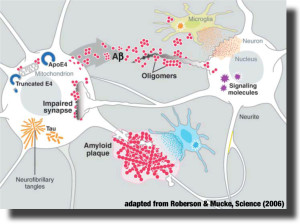“This discovery… speaks to the possibility that we could develop a human vaccine that would prevent Alzheimer’s disease. You know, get your immunization at 50, and perhaps prevent or delay the onset of Alzheimer’s. It’s a very exciting prospect now.” – Dr. Neil Cashman

Next week, international investigators, health care professionals, and industry organizations will come together to share the latest breakthroughs and theories in dementia research at the Alzheimer’s Association International Conference in Washington, D.C. The timing and forum could not be better for Dr. Neil Cashman and his team to announce their recent discovery, which has implications for diagnostic and therapeutic interventions for Alzheimer’s disease (AD), Amyotrophic Lateral Sclerosis (ALS), and Parkinson’s disease.
Their discovery is one that arose from over 20 years of dedication to understanding how and why proteins “misfold” within the human body, and developing targeted solutions to stop the spread. As the fundamental component of all living cells, proteins are made up of long chains of amino acids, which fold around each other in a specific three-dimensional structure to allow cell functioning. Over time, Cashman and his team realized that when a protein misfolds, the cell can no longer function properly, it can cause disease within surrounding cells, and can even “seed” – i.e. trigger the misfolding of other proteins. A tragic domino effect, this process can result in diseases like Parkinson’s, AD, and ALS, and will continue until a therapeutic intervention is discovered.
The good news is that this is precisely where immunotherapy is gaining traction, Cashman explains. He and his team have found a target for amyloid-beta (Aβ) oligomers. Because these are the proteins found in brain plaques in cases of AD and they are toxic to nerve cells, these oligomers were selected by the team. 
The results are incredible. “The antibodies we developed in our animal model bound to synthetic and authentic oligomers in an AD brain in a surface plasmon resonance (SPR) test, the antibodies can block the toxicity, and can even stop the seeding activity of Aβ oligomers.”
This antibody, and the corresponding epitope, were licensed out of UBC by Canadian biotech company, Cangene Corporation (which was acquired by Emergent BioSolutions last year). With that, Cashman’s team were able to complete the animal experiments, and discovered that “the vaccination of Alzheimer’s mice is protective of the spread of Alzheimer’s pathology, Aβ plaques, and certain types of memory loss in a specific model of Alzheimer’s disease.”
More recently, and based on these findings, Cashman’s team and Emergent BioSolutions have validated this target for human Alzheimer’s disease, and see promise that this epitope could lead to a vaccine that would prevent or delay its onset.
The CCNA will play a key role in advancing this work to human trials. Despite the fact that the vaccine’s availability will likely be close to a decade or more down the road, it’s, in Cashman’s words, “a very exciting prospect and discovery now.”
